Smartphones are now so integral to our daily life. So much so that their batteries couldn’t ever keep up with our daytime needs. (Why can’t we get better batteries already!?)
Which leads to charging phone overnight. Because what’s a better time to recharge than when we’re sleeping? But then the paranoia and fear come hailing down on us: overcharging phone and battery explosion. Leaving in us a dilemma we’re all too familiar with …
Convenience or safety???
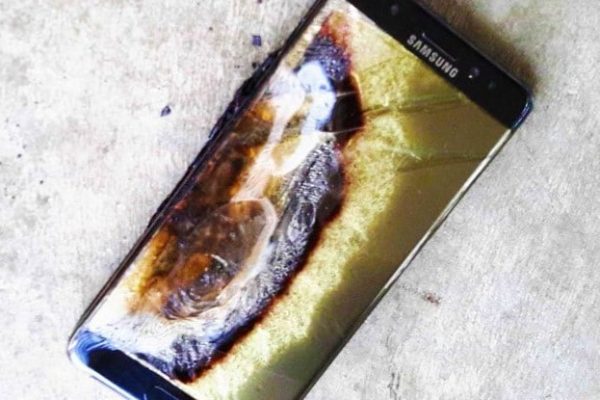
A tiny note: an auto cutoff cable can help take the burden of prolonging battery life off your hands.
But is it really bad to charge your phone overnight?
What’s covered here:
What Happens If You Charge Your Phone Overnight?
So you leave your phone charging overnight … what terrible fate awaits you? The Big Bang? The Reign of Fire? Neither. Your phone gets charged, just that. The myth that this overcharges your phone – oh wait we’ve said it – it’s A MYTH. At least since phones have evolved into smartphones. And as their newly-earned prefix implies, they’re smart, in that they have an inbuilt protection chip that prevents overcharging at full battery.

I repeat. The white mouse will not explode.
Now don’t burst out your party poppers just yet – THERE’S MORE
In place of the now-debunked overcharging threat is trickle charging. It lowers the current matching the discharge rate (or consumption) to maintain 100% charge level.
During overnight charging, your phone constantly uses battery to stay functional, much like all things living; and when consumption happens, recharging happens. And this opens up to a hell of short-lived battery for whoever couldn’t bear to replace their phones every year or two. (If you do, however … Well, you may skip this reading.)

The Real Issues With Charging Phone Overnight
Most phones nowadays use Lithium-ion batteries (LiB). They’re rechargeable and do so faster than rechargeable batteries in the past. They race to 80% in a flash, what with all the fast charging technology boasted by many a clashing smartphone titans (e.g., Huawei and Samsung). Owing to that, phones now take 1 to 2 hours top to fully charge. That’s really saying your precious phone spends most time hooked to the charger at 100% battery while you’re fast asleep. But … what’s the deal?
Stress on Lithium-ion battery. There’s no arguing that Li-ion is superior among batteries. But a champion is not without its weakness. In fact, it’s bordering counterintuitive: Li-ion suffers from stress when dwelling at full state-of-charge (100%). And when it does so consistently month after month, its recoverable capacity will drop; though the decline may not amount to much in the short run, it does leave a dent in the battery capacity that will be a long-term thorn in your side.
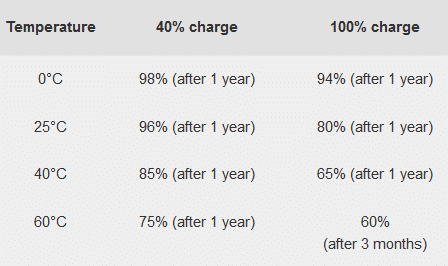
(Source: Battery University – How to Prolong Lithium-based Batteries)
Batteries’ recoverable capacity one year after storing at different temperatures and battery levels
Adding insult to injury, it’s not even advisable to fully charge a Li-ion battery for the same reason; what’s more, prolonging it overnight? The closer it gets to 100%, the more degradation it stomachs. Generally, battery level outside the 20% – 80% range will degrade the battery more. But what could be behind this counterintuitive existence?
How Prolonged Charging Degrades Battery
Surely, you’ve heard that Li-ion batteries are bound to decay since day one; everything they do – cycling, discharging, and charging – wastes away their lifespan. But that isn’t to say the process couldn’t be hastened or delayed by your actions.
When charging, Lithium ions swim across the cathode (the positive electrode of a battery) to anode (the negative electrode), which is exactly how it should be. But it is during which that an irreversible damage also takes place: electrically-insulating rock-salts form & buildup over the cathode. Overtime, the buildup grows and battery capacity shrinks.
The worst of all, the buildup blooms like wildflowers after rainy days at higher battery levels and temperatures. Certainly, maintaining a high battery level longer will degrade the battery faster. And this is even more harmful than cycling a battery.
Which is why many, including Apple, recommend storing your battery at half charge …
To clarify, the problem isn’t inherent in trickle charging but charging and high state-of-charge themselves. However, trickle charging lends itself to prolonging charging and high state-of-charge more than needed, more pronouncedly, in an overnight charging session.
We may have phased out of the old Nickel-era, which condemned users to charge their devices fully on every session, lest batteries’ cyclic memory forget their maximum capacity; now, Li-ion suffers from full charge instead.
What about heat during overnight charging?
It’s widely known that heat damages the battery capacity too. It’s just less an issue concerning overnight charging because, well, it happens whenever you charge anyway. Most heat is stoked up before nearing 100% owing to fast charging; the low voltage of trickle charge means its generated heat is negligible.
Your phone’s condition and where you charge, on the other hand, deserve your attention more. (More on this later.)
How to Delay Battery Degradation When Charging Overnight
Limiting the time spent at full charge
Method 1: The Committed Routine Manager
1. Plan your nighttime charging so it’ll be full before you sleep. In other words, avoid charging phone overnight altogether. If you have a fixed bedtime, plug it to charge 2 hours (or less, depending on charging speed and battery level) before that. Perfectly battery-healthy but inconvenient.
You have to either not use at all or use while charging, which may heat up your phone if heavy-duty apps are involved. And it isn’t suitable for anyone who doesn’t have enough time to fully charge before sleep (e.g., working late, party, etc).
Method 2: The Slow And Steady
2. Swap in a slow cable/charger without fast charging. It’ll help to lower the fast charging heat and time spent at full charge. Your phone might still spend a few hours at full charge, but it’ll be much lesser.
Method 3: The Uncommitted But Carefree
3. Unplug when you wake up … if you do wake up dead in the night from nightmares or for bathroom. Or if you are an early riser. It isn’t much, but it at least helps with minimal effort.
You wouldn’t set an alarm 2 hours into sleeping just to unplug, right?
Method 4:

4. Alternatively, opt for a smart charging cable that cuts off power automatically at full charge. That way, you’ll get to minimize the degradation while getting the smartphone runtime and sleep you need.
BONUS TIP: Use a quality wall charger!
Cheap charger is cheap for a reason. Don’t skimp on that! You’ll risk damaging your phone because cheaper charger may not provide a stable voltage output throughout the charging.
Reducing heat while charging
1. Charge Where Heat Dissipates
Don’t ever charge on a bed, or worst, under the pillow. Unless only for a short while. Even so, you’ll notice how fast it heats up. And resist your desire to stack objects on top like it’s Jenga time.
What makes a good charging spot? Flat and sturdy surfaces like table, bedside cabinet, and floor. Bad spots will be those that are cushiony and trap heat; couch, blankets, and mattress, you name it.
2. Charge Your Phone Naked
No. Not you, but your phone. Yes, phones are fragile. But those thick casings you wrap your phones in trap heat and slow down cooling. Imagine dressing in a winter jacket while exercising. Nonetheless, this doesn’t apply to all as some aren’t as dense, e.g., phone skins. Try to notice how hot your device gets while charging in certain casings.
3. Use Non-Fast Charger
Again, fast charging cooks up battery quickly. So switch to a normal, or better yet, slow charger for overnight charging. Unless you’re the type that only sleeps a short few hours.
4. Charging Is Also Resting
Let your phone be app-free while it’s juicing up. Though the heat isn’t much if you’re using light apps like Messenger or Instagram. GPU and graphics-heavy apps (e.g., games) will generate much more heat, and worse if the phone’s charging.
Wrapping Up
Is charging phone overnight bad? Not a concern if you seasonally upgrade to a new phone. Otherwise, your daily convenience may return to bite you in a year or so, in the form of shortened battery lifespan; and it’s all downhill thereafter until you send it to a repair shop or a dealer for a battery replacement.
Different ways to reduce overnight charging degradation:
- Plan your charging before bedtime
- Use a slow charger
- Unplug as soon as you wake up
- Use an auto cutoff charging cable/power outlet
- Charger overnight on a cool and flat surface
- Remove thick phone casing before plugging in

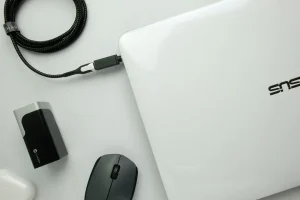

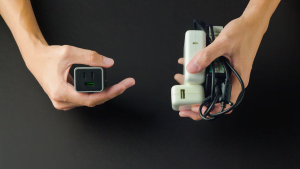
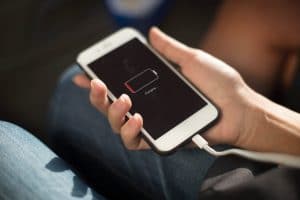
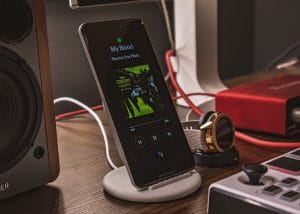

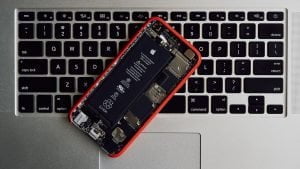


11 thoughts on “Charging Phone Overnight: The real reason it’s bad”
Well I guess there’s at least one benefit to only sleeping for around 3 hours on work days or nights… It doesn’t sit at 100% for long.
Why don’t you just deactivate your phone before you go to sleep. That way it won’t be constantly discharging (using battery) and you can just leave the charger in overnight without damage!
Hello Joseph. What stresses the battery during overnight charging is more prolonged state of full battery than discharging itself.
How about invert the “overnight” plan – put it on the charger in the morning while showering and getting dressed. For me that averages going from 40% to 85%. If below 50% in the afternoon, car charger during the commute home (for those that drive).
Hi there. If you can get enough battery from morning charging that’s definitely better.
Thank you this article was very helpful! You are right it real only takes an hour or two to charge, So I will be charging before I go to bed! Would really like to know if it would help battery life if you turned it off during the 2 hour charging cycle?
Hello Patricia. Glad to hear it’s helpful for you.
Turning off the phone wouldn’t be necessary. Except if your phone generates considerable heat while idle, which normally isn’t the case unless battery-intensive apps are running in the background.
This article totally misses out by far the best solution: use a timer switch to start charging your phone for a set period of time before you wake up, whatever is needed to have it ready for when you are. Also, there are monitoring apps like Accubattery which can alert you when your phone is at a given charge level like 80% and ready to be unplugged.
Hey Peter. Thanks for these great suggestions. Adding a timer switch to the outlet is a solid solution. Accubattery, too, is helpful during daytime charging.
If I am using a samsung wireless charger for my samsung phone, doesn’t it automatically stop charging when my phone is fully charged?
Hello Kevin. Wireless charger, as is wired one, trickle charges to maintain the battery at 100%. It will stop overcharging, but lithium-ion batteries are stressed when hovering at extreme battery levels (0% and 100%); the closer to the extreme, the worse.